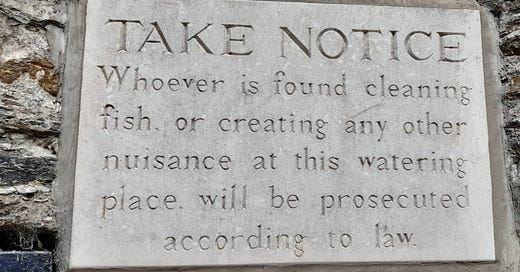Life is a rush. Everyone has got their own agenda, has their own goals, their dreams and ambitions and there’s a good chance that most of the time, they may not align with yours. Sometimes your elbows need to get a little pointy if you’re going to get your way.
When you’re trying to get more done, when you’re juggling the demands of daily life, it’s easy to take shortcuts. And when it seems like everyone is out for themselves, it’s sometimes the wrong road that is the quickest. I’m not talking about robbing banks or stealing cars, I mean the smaller things.
Like not helping someone when you could have done. Doing just as much as you could get away with, rather than the best you could. We all take these shortcuts every day, it’s a normal part of life.
But we also all know what the best thing, or the right thing to do would be in any given circumstance, and if we took just a couple of seconds to think about it, we could all easily do the wrong thing less often.
The problem isn’t that you don’t know what you should do, or that you need to have ethics and morals taught to you, it’s that sometimes taking the right path requires a little more effort. It might be that doing the right thing benefits you (and everyone) more in the longer term, but you need a quick win, to shorten the to-do list, or you’re just trying to get through the day with the minimum of fuss and delay.
This situation, of knowing the right thing but not doing it, is described as ‘betraying yourself’ by the Arbinger Institute in their book ‘Leadership and Self-Deception’.
The book, which is presented as a story, goes on to explain that when we fail to view other people as people (but rather as objects, obstacles or inconveniences), we not only do the wrong thing but end up seeking justification for what we’ve done, by blaming others’ behaviours, traits or previous examples.
This leads to a spiral of negativity that brings everyone down and sets everyone back.
If I’ve done the wrong thing, however small, I will see examples in others of the same thing. I will hunker down and kid myself that there’s no point in leading by example if no one else is going to make the effort. Because everyone is out for themselves, right?
Self-deception, or betrayal, is simply when you know the right thing to do, but you do something different, then construct a narrative around yourself to justify (or prove) why that was okay. And we all do it.
You are seeing yourself as the centre of the universe. Other people are preventing you from getting done what you need to get done. But by being in this frame of mind (‘in the box’, as Arbinger calls it) you allow and encourage that same behaviour from others.
What if I’m the problem?
Give yourself a test over the next week or so, and see how often you end up betraying yourself – in other words, when have you not done the thing that you know you should have done? It doesn’t have to be a big thing – it might have been when you pretended not to hear your other half, or didn’t take as much responsibility at work for something as you could have done.
Fundamentally, this is about being honest with yourself and asking yourself: “what if I’m the problem?” or “where could I have taken a better action?”
Are you being less helpful with certain colleagues or individuals than with others? Or are there certain situations that bring out your worst – are you less proactive at work than you should be, or do you miss opportunities to offer help based on the level of expertise that you have?
I’m always slightly disappointed in myself when I do this exercise - even though I like to think of myself as someone with a decent moral compass, I will reliably miss an opportunity to do the right thing, or will deliberately do the wrong thing, two or three times a day.
There’s rarely any malice or destructive intent behind these actions (or inactions), it’s usually just an occasion where I’ve taken the easy path, or allowed someone else’s enthusiasm (or better nature) to take over and do something for me. Sometimes I just can’t be bothered.
In a previous article I wrote about dealing with morons, and that’s certainly somewhere I’m more likely to get it wrong. If a moron steps in my path, it’s so irresistible to send them on their way with a snarky comment, or to generally obstruct their day. Or ignore them.
I can also realise I’ve not been spending as much time with my youngest as I should do (who is not a moron, but is often grumpy, which itself may well be because I wasn’t giving them enough attention). Or I’m just not being as helpful as I could be, because I’ve somehow convinced myself that I deserve not to.
But those are exactly the occasions when I tend to end up feeling like I’ve let myself down, a bit grubby. I might have snuck myself an extra 10 minutes, or got away without doing something, but I can’t get the enjoyment or benefit from that gain because I know it wasn’t the right thing to do. And you do too.
“Problems can’t be solved if those responsible for the problems remain resistant to the possibility that they may be at fault” - Arbinger
Now the objective here is not to beat yourself up – quite the reverse, it’s to underline the fact that your values are already in the right place and you already know what the right thing to do is, the vast majority of the time.
And then, once you identify the areas where you are not quite following your best instincts, you can quickly start to address those, to take those opportunities, to do the right thing.
By establishing more positive habits, you’ll feel better about the fact that you’re doing the right thing, more often, and will therefore have a more positive impact on everyone around you. You’re helping out the people that you care most about and that are closest to you, while setting a great example to them.
You’ll get more done.
Better still, you’ll find that people respond incredibly positively towards you when you do this, when you establish these more positive habits. They’ll do more of it too.
So here’s a simple plan of action that anyone can follow:
· For the next week, try and spot the times when you don’t do something that you know in your heart you should have (or you do something you shouldn’t). Keep a record of those. And don’t judge yourself, just write it down.
· Identify where or when this happens most often – it might be with certain people, or in types of situation, or even at certain times of day (I’ve noticed, for example, I’m much more helpful in the morning than I am in the evening).
· Then, start to spot those examples as they happen, and do the right thing in real time. You might feel reluctant or resentful at first, or even self-conscious, but you will soon establish a new and more positive habit.
· Finally (and this is the most important bit), keep track of where you took the right path, did the right thing, made the better choice. Give yourself that credit. Looking back is just as important as looking forward and you will very soon see the progress you are making.
You’re not going to fix everything straight away, but if you can break off a theme, or a type of activity, or a person with whom you can be better, do that. Anything here is better than nothing, and doing the right thing is self-perpetuating.
You already know whether you’re doing the right thing or not. You may try to justify why you did or didn’t, but that’s already a slippery slope. This is all about taking responsibility for what you do, even if you’re fighting an instinct to blame someone else. It’s not a race to the bottom.
And the more you do the right thing, the more other people will do the right thing by you.
Give your best instincts the chance to have a more positive impact on everyone around you. And if you’re comfortable doing so, let me know in the comments how you get on.







